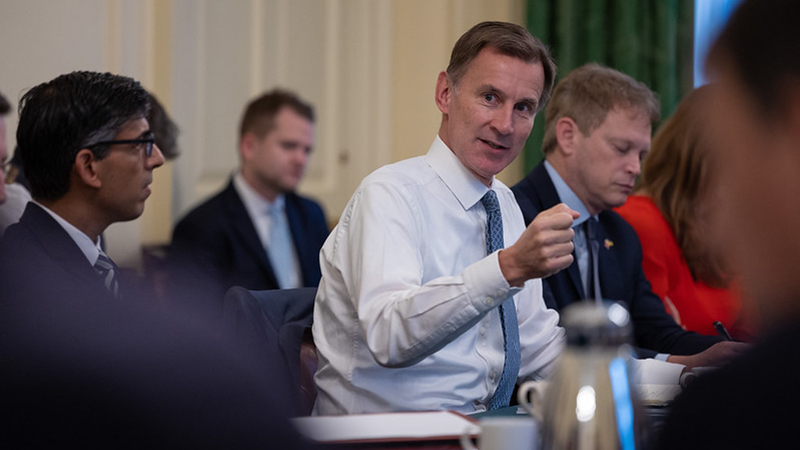The steady-as-she-goes autumn statement on Thursday saw chancellor Jeremy Hunt target energy sector windfalls by increasing the energy profits levy to 35% from 25%. The stopgap levy had been due to expire in 2026 but will now remain until March 2028.
Hunt also announced a 45% electricity generator levy which will be applied on the “extraordinary returns” being made by electricity generators.
Of the windfall hike, Jamie Maddock, equity research analyst at Quilter Cheviot, said: “The biggest argument against the windfall tax has always been how it will kill investment at a time when we need the energy companies ploughing money into the transition to net zero and to alleviate overseas fossil fuel dependence to aid self-sufficiency. We are yet to see a meaningful drop off from the likes of Shell and BP in investment, though it is likely to be the smaller players whose spending could be threatened by this further government intervention. These smaller firms play as equally an important role as the giants in reducing the UK’s dependence on overseas oil and gas.
“However, the government continues to dangle the carrot of tax breaks to the oil and gas producers in order to protect this investment. This is politically controversial given there is no stipulation on what type of investment is permitted. The government has chosen not to tighten the rules around this, acknowledging how much it still needs these businesses. As a result, the government will continue with this blunt instrument that pleases few and remains murky on its effectiveness.”
Martin Currie portfolio manager Jo Rands said that the windfall tax has an extremely limited impact on group profits for the global oil producers such as BP and Shell, and therefore share prices were largely unaffected in response to the autumn statement.
Fears renewable energy investment will be hit hard
Hunt also scrapped the vehicle excise duty exemption for electric vehicles in order to make the motoring tax system “fairer”, with the Office for Budget Responsibility (OBR) forecasting half of all new vehicles will be electric ahead of 2025. Industry commentators gave contrasting views on what the move could mean for investment in the renewable energy sector.
Peter Dickson, partner at Glennmont Partners, a renewable energy and clean infrastructure provider, commented: “The energy transition constitutes the 21st century industrial revolution that has the potential to provide economic growth and energy security for the UK and all European countries. For this reason we applaud the continued support for the renewable energy sector. As long as the government recognises this value and continues to show long-term support for net zero and renewable energy, the private sector will be confident to provide the necessary investment.”
But Lisa Watson, director of sales at Close Brothers Motor Finance, questioned the government’s commitment to its net zero targets. She said: “The government’s own policy is to ban the sale of all new petrol and diesel cars in the UK by 2030, as part of its net zero ambitions. All announcements from the chancellor today suggest the cabinet’s commitment to those ambitions are dwindling.
“The introduction of excise duty to electric cars from 2025 will make already hesitant consumers less likely to make the shift towards alternative fuel vehicles. That, coupled with the ever-increasing costs of electricity and a public charging infrastructure roll-out running at a fraction of the speed of electric vehicle adoption, means an already challenging target is looking dauntingly unachievable.
“While clearly not at the top of the chancellor’s agenda, it is becoming a matter of urgency that the government offers its support to motorists and the motor industry. As a core driver of economic growth, dealers, manufacturers, and drivers will all be hoping for more support in the next budget, to help kick-start sales and get people into the right cars and vans for them.”
Killik & Co senior equity analyst Mark Nelson raised concerns over the knock-on effect the windfall tax could have for green investment. “The increased taxation on energy companies and energy generators could impact the financial returns available for companies investing in renewable energy and therefore reduce money flowing into the sector and in turn generation.
“That said, renewable projects are subsidised through Contract for Difference schemes now which limits both the upside and downside to energy prices through the life of the contract. As these schemes are not subject to taxation, it likely won’t deter future investment into this area, though it may deter corporates from pursuing merchant projects – that is projects outside of subsidy schemes.”
Markets calm in response
Markets remained stable in the wake of the autumn statement, in contrast to the turmoil caused by the former chancellor Kwasi Kwarteng’s mini budget in September.
Mike Owens, senior sales trader at Saxo UK, noted: “There were plenty of tax reforms announced with the windfall tax on the oil & gas sector, levy on electricity generators, tax free allowances on dividends and capital gains also lowered. All of these broadly in line with expectations although we have seen share prices of energy companies like SSE, Centrica, National Grid and Drax slip in early reaction to the news.
“The extension of the energy price guarantee for a further 12 months should be positive for utilities. Share prices of UK banks are also gaining as the surcharge of profits over £100m is to be cut to 3% from 8% from April 2023 in an effort to offset the impacted of the corporation tax rise.
“The broad take is that both gilts and the pound have staged a meaningful recovery in the first few weeks of the [Rishi] Sunak government. [Thursday’s] announcement of the autumn statement, which is fiscally prudent but nevertheless paints a bleak picture of the state of the UK economy, gives markets an excuse to take a little bit off the table.”










